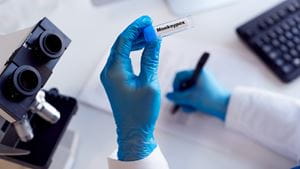
Scientists around the world are paying close attention to an unusual increase in the number of cases of mpox - formerly called monkeypox.
While rarely fatal, mpox infections can lead to very painful symptoms and lead to permanent scarring from rashes that may develop.
Our infectious disease experts at Rochester Regional Health share the basic details of this disease and what people need to know.
First discovered in the 1950s, mpox is a rare disease caused by a pox virus. Its name is derived from its initial discovery in a colony of monkeys at a research facility. The first known human case was in 1970 in the Democratic Republic of Congo.
Mpox is primarily transmitted from animals to humans. This can be either through close contact between animals and humans, or by eating the meat of an infected animal that has not been thoroughly cooked.
The mpox virus can also be transmitted from human to human. It is not considered a sexually transmitted infection (STI), as it can be spread through close, non-sexual physical contact.
From when a person is infected to when they first begin displaying symptoms, the time range is approximately 7-21 days.
Individuals infected with the virus will experience symptoms such as:
According to the CDC, an infected individual will show signs of a rash within 1-3 days of having a fever. The rash will typically start on the face and spread to other parts of the body.
Researchers describe the rash as initially flat, then becoming raised and filled with fluid that eventually hardens and crusts over before becoming a scab.
Typically, an individual who contracts mpox will have an illness lasting 2-4 weeks.
Suspected cases are tested for the virus using a sample taken directly from an individual’s rash. The sample is run through a PCR test to match the viral DNA sequence.
Most commonly, person-to-person transmission happens through close physical contact with a symptomatic individual. This can include:
An infected individual who is pregnant can spread the virus to a fetus via the placenta, or during or after birth through skin-to-skin contact.
Early data collected by the World Health Organization and the CDC suggest that gay, bisexual, and other men who have sex with men have the majority of confirmed cases so far. However, CDC officials stress that mpox can affect anyone – regardless of their gender identity or sexual orientation.
A mpox pandemic – like the COVID-19 pandemic we are currently in – is highly unlikely since the mpox virus spreads through close, direct physical contact. COVID-19 spreads through the air.
Approximately 90 percent of all mpox cases resolve after the infection period. In rare circumstances, some infected individuals can become severely ill or die from the virus.
It is highly unlikely that most people will come into contact with an individual infected with mpox. But for healthcare workers or someone who does come into contact, they can help prevent infection by:
If needed, there is several approved antiviral medications available via prescription, as well as a vaccine preventing infection of smallpox and mpox that was approved by the FDA in September 2019. Adults receiving the vaccine will need to get two doses four weeks apart. Similar to the COVID-19 vaccine, a person is not fully protected against the virus until two weeks after receiving their second dose.
People are strongly encouraged to consider vaccination if:
If you have a rash that looks like mpox – even if you did not have contact with someone with mpox – consult with your primary care provider about what to do next.